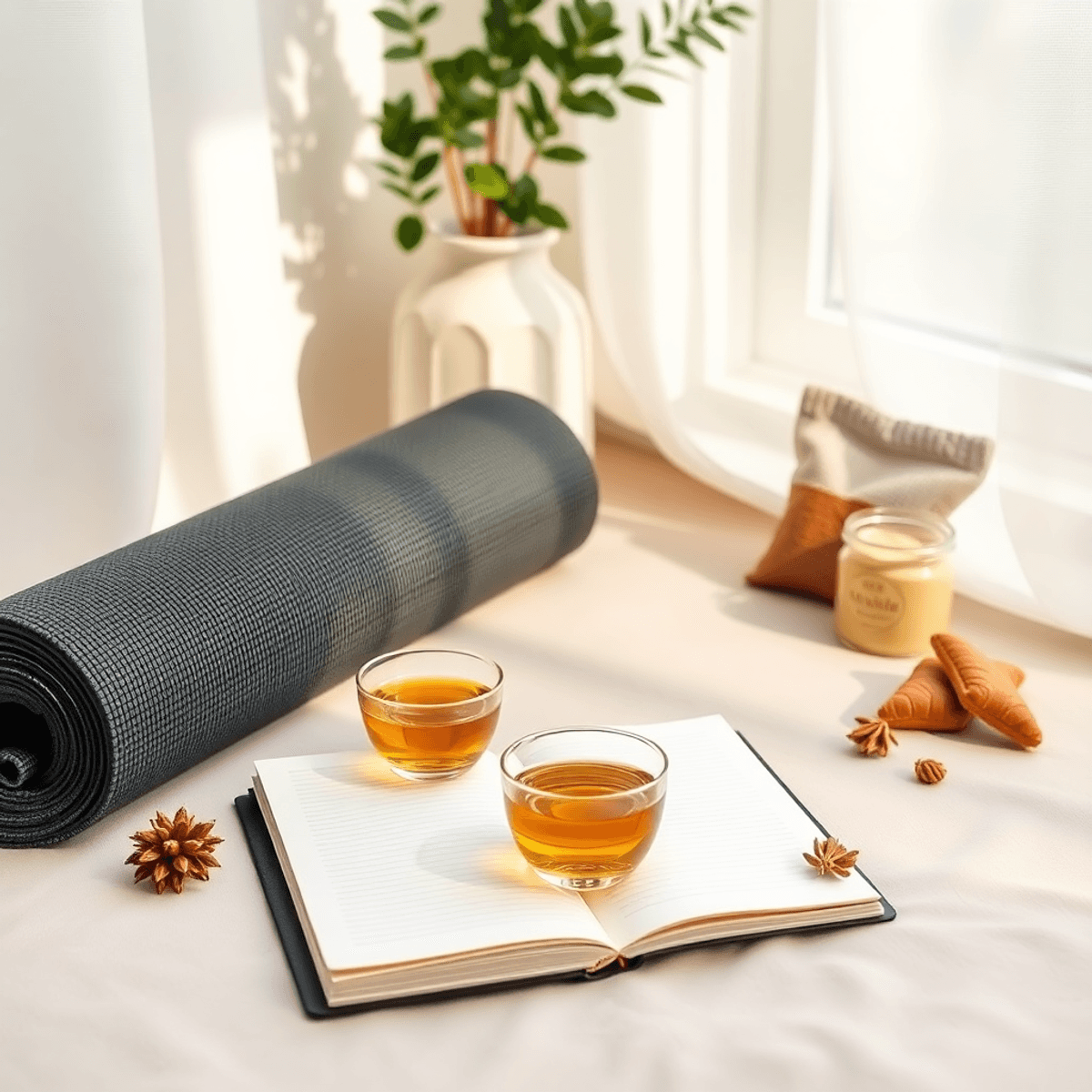Creating a personalized self-care routine isn’t just about bubble baths and face masks—it’s a deliberate practice that nurtures your physical, emotional, and mental well-being. Your unique self-care journey reflects your individual needs, preferences, and lifestyle.
A well-crafted self-care routine serves as your daily anchor, helping you:
- Reduce stress and anxiety
- Boost energy levels
- Improve mental clarity
- Strengthen relationships
- Enhance physical health
- Build emotional resilience
The key components of an effective self-care routine include:
- Physical wellness – exercise, nutrition, and sleep
- For instance, incorporating medications like Ozempic into your weight management plan can be a valuable part of this component.
- If you’re experiencing prolonged fullness after meals on Ozempic, here’s why.
- It’s worth noting that switching from Jardiance to Ozempic is possible under certain considerations.
- Emotional balance – mindfulness, stress management
- Exploring treatments such as Ketamine for anxiety might provide some relief if you struggle with anxiety.
- Social connections – meaningful relationships
- Mental stimulation – learning and creativity
- Spiritual growth – meditation, reflection
- Practical self-care – organization, time management
Your self-care routine should feel natural and sustainable—not another item on your to-do list. By designing a routine that aligns with your lifestyle, you’re more likely to maintain these healthy habits long-term.
1. Understanding Your Unique Needs
Self-awareness is the key to creating a self-care routine that genuinely works for you. Your needs differ from others based on your:
- Personal circumstances
- Daily stressors
- Energy levels
- Available time
- Current lifestyle habits
- Individual goals
To gain clarity about your unique requirements, ask yourself these essential questions:
Physical Well-being
- How much sleep do you need to feel energized?
- What type of movement brings you joy? Regular exercise has numerous benefits for mental health.
- Which foods make you feel your best? Be mindful of any medications you’re taking, like Ozempic, and their implications. For example, Ozempic is not considered safe during pregnancy.
Mental and Emotional State
- What activities help you destress?
- When do you feel most balanced?
- What triggers emotional exhaustion?
Time and Resources
- What realistic time blocks can you dedicate to self-care?
- Which activities fit within your budget?
- What resources are readily available to you?
Take a week to observe your patterns. Notice when you feel energized, stressed, or depleted. Track your moods using a mood chart and journal about your energy levels and daily habits. This data becomes your personal roadmap, revealing areas that need attention and highlighting activities that naturally align with your lifestyle.
Remember that your needs change with different life phases, seasons, and circumstances. Regular check-ins with yourself help adjust your routine to match your current situation.
Consider how certain health conditions or treatments might affect your self-care routine. For instance, if you’re experiencing issues related to gut health such as constipation due to intestinal methanogen overgrowth, it would be beneficial to incorporate dietary changes or seek professional help.
Similarly, if you’re undergoing testosterone replacement therapy (TRT), understanding its impact on your overall health can guide you in making informed decisions about your self-care routine.
If weight management is one of your individual goals, it’s important to understand how certain medications like Wegovy interact with lifestyle choices such as alcohol consumption. Here are some essential tips for safe consumption while using Wegovy.
Incorporate keystone habits into your daily routine for effective change and growth.
2. Building a Well-Rounded Self-Care Routine
Creating a balanced self-care routine requires strategic selection of activities across multiple life dimensions. Here’s how to build your personalized routine:
Physical Well-being Activities:
- 10-minute morning stretches
- Daily walks during lunch breaks
- Meal prep on weekends
- Regular bedtime routine
Emotional Health Practices:
- 5-minute breathing exercises
- Journaling before bed
- Weekly art therapy sessions
- Listening to calming music
Social Connection Activities:
- Virtual coffee dates with friends
- Monthly book club meetings
- Weekly family game nights
- Lunch with colleagues
Start with one activity from each category that resonates with you. Pick activities that fit naturally into your existing schedule – this reduces the pressure to make dramatic lifestyle changes. A morning person might choose early yoga, while night owls might prefer evening meditation.
Time-Efficient Integration Tips:
- Stack new habits onto existing routines (meditation after morning coffee)
- Use waiting time productively (stretching while watching TV)
- Set phone reminders for quick self-care breaks
- Keep a water bottle at your desk for hydration
Your initial routine might look like this:
Morning: 5-minute gratitude journaling
Afternoon: 10-minute walk
Evening: Quick catch-up call with a friend
As these activities become habitual, gradually add new elements. You might extend your morning journaling to 10 minutes or add a weekend yoga class. Listen to your body and energy levels – some weeks you’ll do more, others less.
Scheduling Strategies:
- Block specific times for self-care activities
- Use calendar apps for reminders
- Create a visual tracker on your phone
- Share your schedule with accountability partners
Remember that a sustainable routine feels energizing, not draining. If an activity consistently feels like a chore, replace it with something you genuinely enjoy. Additionally, don’t forget the importance of self-care in enhancing physical appearance; exploring the latest breakthroughs in skincare technology could be beneficial for your beauty routine, and incorporating intermittent fasting into your diet may also improve overall well-being.
3. Key Elements in Each Area of Self-Care
Social Connections
Strong relationships act as protective factors against stress, anxiety, and depression. Research shows people with robust social networks live longer, healthier lives. Here’s how to nurture your relationships in a time-starved world:
- Schedule regular virtual coffee dates with long-distance friends
- Create a monthly dinner rotation with local friends
- Send voice messages instead of texts to maintain deeper connections
- Join interest-based groups aligned with your hobbies
- Block out dedicated family time without digital distractions
Mindfulness & Emotional Balance
Meditation and mindfulness practices rewire your brain for improved emotional regulation and reduced stress response. A consistent mindfulness practice:
- Lowers cortisol levels by up to 20%
- Improves sleep quality
- Reduces anxiety symptoms
- Enhances focus and concentration
- Builds emotional resilience
Quick Mindfulness Practices:
- 5-minute breathing exercises during work breaks
- Body scan meditation before sleep
- Mindful walking during lunch breaks
- Simple desk stretches with breath awareness
- Guided meditation apps for beginners
Intellectual Growth
Mental stimulation through learning keeps your brain sharp and provides a sense of accomplishment. Research indicates regular intellectual engagement can delay cognitive decline by up to 5 years.
Brain-Boosting Activities:
- Read diverse genres to expand your perspective
- Learn a new language using apps like Duolingo
- Take online courses in subjects that intrigue you
- Solve puzzles or play strategy games
- Write creatively or start a blog
Reading Benefits:
- Enhanced vocabulary and communication skills
- Improved empathy and emotional intelligence
- Better sleep when reading before bed
- Reduced stress levels
- Increased knowledge and creativity
Practical Integration
Mix these elements throughout your day:
- Listen to educational podcasts during commutes
- Read while exercising on stationary equipment
- Practice mindfulness with friends in group sessions
- Join book clubs for social and intellectual stimulation
- Use lunch breaks for both social connection and mindfulness
Nutrition & Wellness During Transitions
As you navigate different stages of life, such as menopause, menopause-friendly nutrition can significantly improve your overall health. Specific dietary changes can alleviate menopause symptoms, making this transition smoother.
Additionally, understanding the benefits of proper hydration is crucial for maintaining optimal health. From cognitive performance to weight management, hydration plays a vital role in our overall wellness.
For those looking into weight loss management, exploring the 96-hour fast could provide beneficial insights. This fasting method has shown potential in enhancing gut health and boosting weight loss effectively.
Finally, if you’re managing Type 2 diabetes, it’s important to understand the differences between medications like Jardiance and Ozempic. Our guide compares these two drugs for diabetes care, highlighting their differences, benefits, and side effects for informed choices.
4. Sustaining Your Personalized Self-Care Routine
Maintaining a self-care routine requires strategic planning and genuine enjoyment of your chosen activities. Here’s how to keep your routine vibrant and sustainable:
Make It Fun
- Choose activities that bring you genuine joy and satisfaction
- Mix up your routine with new variations of familiar activities
- Celebrate small wins and progress milestones
- Create a reward system that reinforces positive habits
Track Your Progress
- Use a habit-tracking app or journal to monitor consistency
- Take progress photos or notes to visualize improvements
- Record how you feel after each self-care activity
- Notice patterns in your mood and energy levels
Build Support Systems
- Share your self-care goals with trusted friends
- Join online communities focused on similar wellness goals
- Find an accountability partner for mutual encouragement
- Schedule regular check-ins with yourself to assess what’s working
Adapt and Adjust
- Listen to your body’s changing needs
- Modify activities based on your energy levels
- Scale activities up or down depending on your schedule
- Replace activities that feel like chores with ones you look forward to
Remember: A sustainable self-care routine feels natural and energizing rather than forced. When you genuinely enjoy your chosen activities, consistency becomes second nature.
Incorporating elements such as holistic stress management techniques into your routine can further enhance its effectiveness. Additionally, if you’re considering medical options like Ozempic for weight management, it’s crucial to be aware of potential side effects such as gastrointestinal issues, which could impact your self-care journey.
5. Seeking Support Along Your Journey
Your self-care journey doesn’t have to be a solo adventure. Building a strong support network can enhance your progress and provide valuable guidance when challenges arise.
Friends and Family Support
- Share your self-care goals with trusted loved ones
- Ask for accountability partnerships
- Schedule regular check-ins with supportive friends
- Create shared self-care activities with family members
Professional Guidance
- Mental health professionals can offer personalized strategies
- Wellness coaches help refine your self-care approach
- Support groups connect you with others on similar journeys
- Licensed therapists provide expert insights for emotional well-being
Remember: seeking help isn’t a sign of weakness—it’s a powerful step toward growth. Professional support can illuminate blind spots in your self-care routine and provide tools you might not discover on your own.
Track your progress through journaling, apps, or regular check-ins with your support network. These reflections help identify patterns, celebrate victories, and adjust your routine when needed.
In addition to these strategies, it’s important to prioritize women’s health as part of your self-care journey. This includes understanding chronic conditions like diabetes and making informed dietary choices such as incorporating healthy snacks into your routine.
Moreover, exploring innovative wellness practices such as the NAD+ injection for anti-aging and cognitive enhancement can also be beneficial.
Additionally, consider the potential benefits of integrating unique health trends into your regimen, like butterfly milk, known for its antioxidant properties and positive effects on eye health.
Lastly, reflect on how positive childhood experiences can shape our adult health outcomes, including heart health.
Conclusion
Creating a personalized self-care routine isn’t a one-size-fits-all journey. Your unique needs, preferences, and life circumstances shape the path to your well-being. Remember: what works for others might not work for you – and that’s perfectly normal.
Stay flexible as you build your routine. Life changes, and your self-care practices should adapt alongside it. Listen to your body, mind, and spirit. Adjust your activities when needed, and celebrate small wins along the way.
Your commitment to self-care is a powerful investment in your physical, emotional, and mental health. Start today, take it step by step, and watch your personalized self-care routine become a natural part of your daily life.
FAQs (Frequently Asked Questions)
What is a personalized self-care routine and why is it important?
A personalized self-care routine is a tailored set of practices designed to meet your unique physical, emotional, and social needs. It plays a crucial role in maintaining overall well-being by addressing individual requirements and promoting balance in various areas of life.
How can I assess my unique needs to create an effective self-care routine?
Assessing your current situation through self-awareness helps identify your specific needs and goals. Reflecting on what areas require attention allows you to build a personalized routine that truly caters to your individual well-being.
What are the key components of a well-rounded self-care routine?
An effective self-care routine includes activities from different life domains such as physical health, emotional balance, social connections, and intellectual stimulation. Starting small with manageable tasks and scheduling them consistently ensures a holistic approach without feeling overwhelmed.
How do nurturing relationships contribute to my self-care routine?
Nurturing relationships is vital for mental health as social connections provide support, reduce stress, and enhance emotional well-being. Prioritizing meaningful interactions within your busy lifestyle strengthens this essential element of self-care.
What strategies can help me sustain my personalized self-care routine over time?
Staying motivated involves engaging in enjoyable activities that resonate with you and maintaining consistency. Finding joy in your chosen practices encourages commitment and helps your self-care routine become a lasting part of your life.
When should I seek support during my self-care journey?
It’s important to reflect on your progress regularly and recognize when additional help is needed. Seeking support from friends, family, or mental health professionals can provide guidance and encouragement to enhance your personalized self-care journey.






